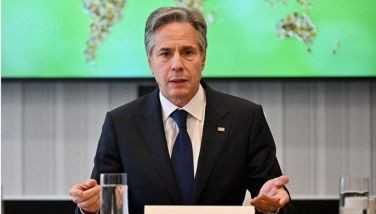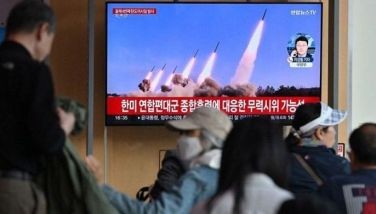EU leaders agree on new anti-terror measures
BRUSSELS — Spurred to action by last month's terror attacks in France, European Union leaders agreed Thursday on an ambitious range of new steps to better protect their countries from terrorism.
Actions unanimously endorsed at an EU summit meeting include the sharing of airline passenger data, tougher border controls on travelers and the detection and removal of Internet content promoting terrorism or extremism.
"All citizens have the right to live free from fear, whatever their opinions or beliefs," the EU leaders declared in a joint statement. "We will safeguard our common values and protect all from violence based on ethnic or religious motivations and racism."
Gilles de Kerchove, the EU's top counter-terrorism official, told The Associated Press that the leaders' action plan, some of which still requires approval by the European Parliament to go into effect, will make Europeans safer.
It "keeps reducing our vulnerabilities," De Kerchove said. In a report to the 28 EU member countries last month, De Kerchove warned "Europe is facing an unprecedented, diverse and serious terrorist threat."
Counter-terrorism policy shot to the top of the EU agenda following the Jan. 7-9 attacks in Paris against a satirical weekly, a policewoman and a kosher grocery store that claimed a total of 17 victims. The three gunmen, who proclaimed allegiance to Al-Qaida in Yemen and the Islamic State group, were also shot dead by French police.
The attacks mobilized France and other EU member countries to seek more effective ways to deal with armed Islamic militancy, especially the problem of radicalized European-born Muslims who go to fight in Syria or Iraq and then return home.
The bloody violence in the French capital was "a game-changer" for EU counter-terrorism efforts, said Alexandra de Hoop Scheffer, senior trans-Atlantic fellow and director of the Paris office of the German Marshall Fund think tank. To prepare for Thursday's summit meeting in Brussels, EU foreign, finance and interior and justice ministers were ordered to draw up recommendations on what to do.
The plan finally approved by the heads of state and government calls for a wide array of measures in fields ranging from foreign policy to the functioning of law enforcement agencies. In some instances, it insists on the need for rapid or urgent change.
At a news conference, European Parliament President Martin Schulz signaled his clear willingness to cooperate, but said there are red lines he and other lawmakers will refuse to cross. He endorsed more systematic passport and customs controls on people coming and going from the so-called Schengen area of 26 European countries, 22 of which are EU members, but said movement inside the zone must remain unhindered.
Schulz also warned that rashly curtailing individual rights in the name of boosting public safety would play into the terrorists' hands by discrediting Western-style democracy.
"We need to be a state of law and democracy," Schulz said. "We need to protect our values."
Finnish Prime Minister Alexander Stubb said it was imperative to strike "a careful balance between civil liberties and security."
An earlier attempt to launch an EU-wide exchange of air traveler data for prevention, detection, investigation and prosecution of terrorist offenses and other serious crimes died in the European Parliament in 2013 when a committee rejected it on civil liberties grounds.
On Wednesday, European Parliament members, by a 532-136 vote, pledged to work toward getting a passenger name record program enacted by the end of 2015, but insisted the EU simultaneously rewrite its rules on data collection and sharing to ensure legally-binding protections.
Even this condition wasn't sufficient for Europe's Greens, who opposed what they said was equivalent to "carte blanche for EU governments to scale back personal freedoms."
At their summit, European Union leaders agreed "to proceed without delay to systematic and coordinated checks" on travelers exiting and entering the Schengen area whose movements are flagged as suspicious by databases that use unspecified "common risk indicators."
The heads of state and government also pledged to increase cooperation in areas ranging from the fight against the illicit trafficking of firearms to the functioning of their countries' counter-terrorism and security services.
They also pledged to quickly implement tougher rules to combat money laundering and other sources of terrorism financing, and "to freeze effectively assets used for financing terrorism."
"Preventing radicalization is a key element of the fight against terrorism," the EU leaders declared. They called for measures that, while respecting national guarantees to free expression, will detect and remove Internet content "promoting terrorism or extremism," including through increased cooperation with private companies. De Kerchove said the action plan lays the groundwork for an EU-wide effort orchestrated by Europol, the bloc's agency for law enforcement cooperation.
EU leaders also agreed their diplomatic efforts must do more to counter the terrorist threat, including through increased engagement with nations in the Middle East, North Africa and Western Balkans.
- Latest
- Trending
































